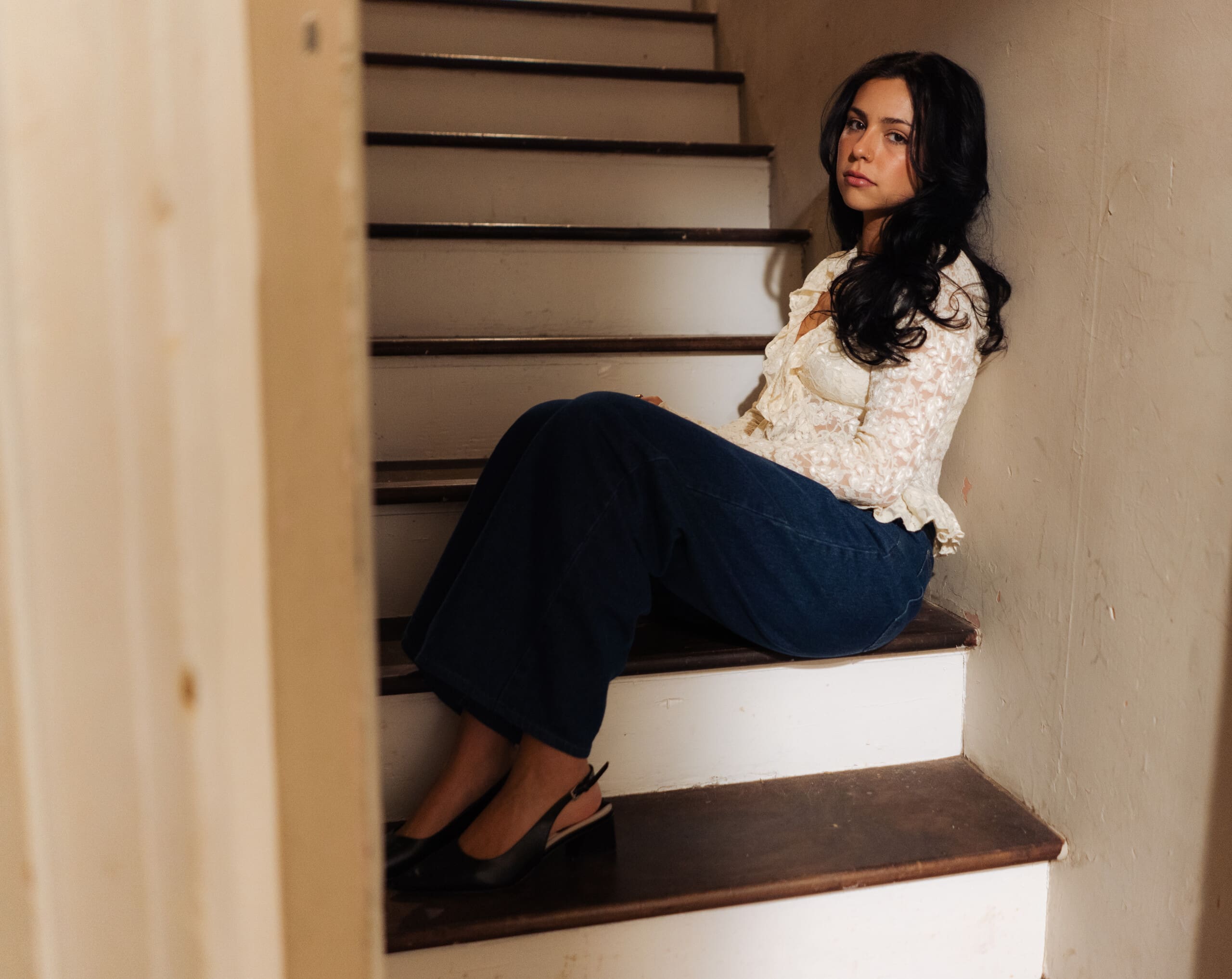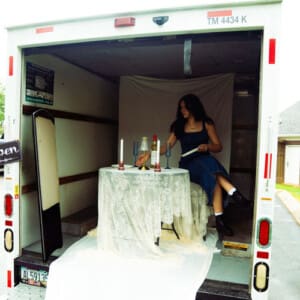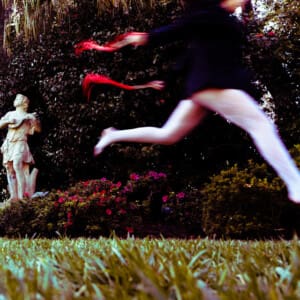
Written by Heidi K. Schoderbek
Not many artists are thinking about attachment theory when they sit down to write a song, but Savanna Leigh isn’t most artists. In her new single, “cut to the chase,” the Nashville-based singer/songwriter draws on her personal experiences dating with an avoidant-attachment style, crafting something that is honest, witty, and deeply self-aware. At just 25-years-old, Savanna is building her catalog with hard-hitting song lyrics and a sound that blends indie pop with real instruments, pulling inspiration from artists like The Marias, Sheryl Crow, and Gracie Abrams.
Recently, I spoke with Savanna Leigh right before her show in Asbury Park, NJ, where she’ll be opening for Juniper, to talk about the bad date that inspired “cut to the chase,” her time at the Anti-Social Songwriting Camp in NYC, and how embracing vulnerability has shaped her music. From learning how to engage audiences as an opener to reflecting on unhealthy dating patterns, Savanna opens up about what it means to grow as both an artist and a person. While she’s not quite in her “lover girl” era yet, she’s leaving the door open.
Hey Savanna. Thank you so much for meeting with me today! Let me just say, I love your new single “cut to the chase.”
Thank you so much! I really appreciate that. It’s one of my favorites, so I’m really glad it’s finally out there.
So, tell me a little bit about the Anti-Social Songwriting Camp in NYC. What was that experience like?
It honestly feels like a big networking event. There’s sessions, you’re writing music, working with new people, going to a lot of panels and getting to watch people in the industry talk about whatever their specialty is — whether that’s a sync panel, or women in the industry talking about the different organizations they run, and the experiences they’ve had as female producers, writers, artists, all the things. It’s really cool. It’s a lot of networking, and I don’t really have a New York network yet, necessarily. So, it was nice for me to get to step into that this week in a way that I wouldn’t have been able to without the camp.
Were there any standout moments or key takeaways that you’re going to take from that experience?
The importance of community in the industry and just putting yourself out there. I’m someone who, I would not say is introverted, but I’m also not very extroverted either. I feel I’m in this middle ground. There’s a name for it in psychology — it’s called an ambivert. his camp has been a good reminder that I’m capable of being here alone, meeting new people, and putting myself out there. Music is hard, and it’s important to have community, and this camp is designed for that—to meet people that are similar to you and get inspired. So, it reminded me that I can be a lot more social than I think.
I can relate to that. Now you’re gearing up for your show in Asbury Park [at The Baronet at The Asbury Hotel] this week, opening for Juniper. How are you feeling going into the show?
I feel good-ish. I got really sick a couple of weeks ago with a bronchitis situation. I did the antibiotics and all the meds, but I feel like the cough is lingering, which is not a great feeling going into any kind of tour. I just need to have some recovery time before I go out.
I definitely am excited. I’m looking forward to being back on the road. I miss it. I haven’t been out since March when I ended the last tour I did, so I definitely want to be back and perform again, so I’m excited for it.
What’s your favorite thing about touring and performing live? It sounds like it’s a great experience, but it also sounds like it might take a toll on your body.
For sure. I think my favorite part is obviously the face time you get with people who care about your music, and winning over people who don’t know who you are. I love sharing my music with new people and getting to have that experience. In recent years, I’ve been an opener in a lot of situations, and so it’s definitely a challenge. It’s exciting, though, because you get to use a muscle you wouldn’t normally get to use. As the headliner, you come out, and you already know that the people out there love you and care about the songs and are there for you. When you’re the opener, you can’t really care too much about what people think. You have to put yourself out there and not be afraid to fail, and just have fun and try to get people to understand what you’re going for, brand-wise and vision-wise.
I’ve enjoyed it. I love new experiences. I love being put into situations that make me feel like I’m growing, and I feel like that’s consistently happening on the road. My favorite part is obviously just connecting with real people through the music and seeing a result. It’s hard sometimes when all you see is numbers on a screen.
Like I said, I love your new single, “cut to the chase.” What would you say inspired the song?
It was inspired by a bad date. Now that I’m an adult and I got really into the psychology world a few years ago — I think I hadn’t really touched too much on that in my catalog at all, about recognizing you have a pattern of dating guys that you knew probably from the beginning weren’t going to be long term, but you were just like, ‘Oh, whatever it’s for the plot’ or ‘It’s summer.’ Always pursuing emotionally unavailable people because you’re also emotionally unavailable just leads you to staying single at the end of the day. You’re going to go on dates, but ultimately, you’re not going to feel fulfilled by that long-term.
I turned 25 this year, and I was just in a different headspace, and I was reflecting on that date, and two dates in thinking, ‘Why did I even keep going out with you? I know I’m not going to date you.’ There’s a sense of humor to it, and I wanted it to be funny and a little witty and sarcastic, because that is a large part of my personality that I don’t share often in my music. It’s honestly just about having an avoidant attachment style and recognizing patterns, and not loving the patterns you’re recognizing, and trying to make light of it, while also bringing self-awareness into it.
Would you say that making music that is relatable to your listeners is a main goal of yours?
For sure. When I started solo and got a management team, it was important to me to be myself in all aspects— even the lyrics are me, and experiences that I’ve gone through; it’s all very true to me. Which is obviously uncomfortable in some ways, too. It’s very personal and vulnerable, but I’ve been drawn to storytelling my whole life, and people who can translate their emotions or internal experiences into songs. I think that’s why I’m so drawn to psychology.
I grew up listening to music and thinking that everyone who makes those emotional songs must be so open, vulnerable, and wear their heart on their sleeve. And sometimes that was the case, sometimes not. But I think I’ve always felt out of place in that way and in the industry, because the way I present to most people is more logic-driven and business-y, and less emotional— and you would think, as a musician, you’re going to be wearing your heart on your sleeve. So, I think there’s a world out there for girls who have that feeling too, where they’re just like, ‘I actually do have big feelings and emotions and care a lot, I just may not present that way outwardly.’ It takes time to get to know me before I show you the softer sides of my personality. I really wanted to make music that targets that audience, because I’m the exact same way.
You’re great at writing those hard-hitting lyrics that sound like they’re very genuine to your experience, but also very specific to a lot of young women’s experiences. How do you balance making music that’s authentic to your experiences but also relatable to a wider audience?
I try to write very direct lyrics. I’m very much a specific writer— I’ve always been that way. Abstract lyrics don’t really feel natural to me. The way I perceive the world now, as an adult and somebody who is very into psychology, I feel like there really isn’t an original experience.
The reality is, most people have been through the same things, and maybe it’s just in a different font, but it’s the same vibe. If I’m speaking from a very authentic place, even if it’s something as specific as “cut to the chase” with the lyrics. Maybe they don’t relate to their date quoting philosophers, but they’ll relate to their date thinking they’re smarter than them or being very pretentious. I really wanted the chorus to be broad, saying, ‘My type is guys that won’t work out.’ I think that a lot of people can relate to that. Even if the verses were hyper-specific to my story, I think people find themselves in it. There are really not that many experiences that other people haven’t had. So, if you’re just honest about your feelings and what you’re experiencing, I think other people will relate to it.
Definitely, the lyrics are destined to relate to somebody. In “cut to the chase,” you talk about starting a new chapter and wanting to be more open to genuine connections. What do you think that means for the direction that your music is heading? Are we going to get a lover girl era?
I don’t know. Love songs ick me out a little unless they’re beautifully written, which there are plenty of, but there are some that are just corny, of course. My worst fear is someone being like, ‘her song is corny.’ I think love songs are hard for me in that way, because I always feel like I’m really teetering the line of ‘this is really corny.’ I think it’ll be easier when I’m really in love with someone again. I went through a long-term situation that was not good for me, and that really developed my projects early on—it was a huge inspiration to a lot of the heartbreak and tougher songs I was writing about.
I could see there being a ‘lover’ era eventually, if I could find the right guy. But at least, right now, I’m more open to relationships—I was closed off to them for a really long time. I think that’s the nice thing now, is, a lot of these songs are about letting go of your grip on everything in life and letting the messiness happen. I think that will probably come with me meeting somebody at some point that will maybe last for longer than a month. We have some contenders. It’s too early to say, but we’ll see. We’ll see if it inspires a little love song. If not, it’ll probably be a little bit more of a positive song.
Well, I’m excited to see what you do next, whether it’s lover girl-coded or not. Overall, what do you hope listeners take away from “cut to the chase?”
I hope they laugh, first of all. I hope they have fun listening to it. I think it’s hilarious. When I sing it live, I laugh at myself, and I can’t take myself seriously.
But also, it’s not supposed to be a song that’s like, ‘being toxic is good.’ The bridge literally says, ‘If I make space, I won’t be missing all the good things and the could-bes,’ and that was something that I wanted to throw in there at the end. If you keep doing this and dating guys that are not going to work, you’ll never make enough space in your life to meet people who could be the one or who could be good for you. So, it’s not supposed to be championing avoidant-ness. It’s supposed to be like, ‘yes, this is true. It’s self-awareness, it’s fun, and whatever, but we have to cut to the chase— we have to stop doing this. We have to be mature, be adults, take it seriously, and work on ourselves.’ So, I hope that’s more the energy, rather than like them romanticizing being avoidant, because it’s not a good thing, necessarily.
Sonically, how do you think “cut to the chase” reflects where you are right now as an artist?
I think it’s very on par with what I’ve been wanting to get to for a long time. It feels very authentic to me right now. I think the indie pop lane and mixing in real instruments with pop elements is important. My early stuff was very pop, and I don’t regret making that music; I love that era of my life, and those songs mean a lot to me in different ways. But sonically, they did not fit long-term with what my goals were. Now it feels like a good mix of what I grew up on, which is country music, which is very much the storytelling, writing, the real instruments, but also my sound just naturally leans more pop. Having my producer, Matt, that I worked on this project with and having his influence and his background mixed with mine and finding a way to make that unique sound of a mix of all my favorite things, rather than it being one specific genre— It’s cool. It makes me happy that I’m locking in more every time to the sound that I want to get to.
And with that, what artists have been inspiring you most lately? Or has it evolved over time?
It definitely changes all the time because there’s so much music out. Right now, with this project specifically, I was really inspired by The Marias, Gracie Abrams, and old Sheryl Crow. Kind of that world of pop, but it’s very, very raw. And indie music almost has an aspect of that to it. My producer comes from a very different background from mine, more of a rock background. So, it’s cool to combine those influences together.
What’s next for you? Will you be hitting the road again? Are you working on any music?
I’m still working on music. I’m writing all the time, but also in recording mode and releasing at the same time. It’s a whole thing, but definitely, new music is coming. I am going to London in the summer to do some work out there and record a video. I’ve never been to London, and I’m excited to get into the community. After the Juniper shows, I have a couple of shows in the summer with Esha Tewari, who is a really sick artist based out of Australia; she’s doing a North American tour, and we’re doing a couple of shows together. Then, I’m hoping for a bigger fall tour, similar to the one I did earlier this year. I would love to do something that’s longer, like another month-long tour, or something even longer than that. So, we’ll see, but that’s the hope for the fall. And new music, of course.



